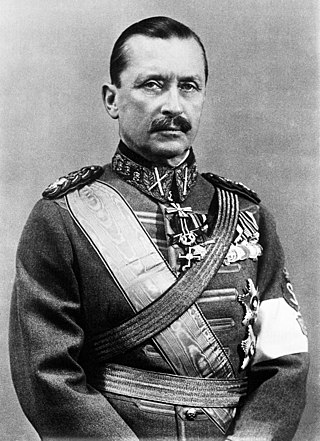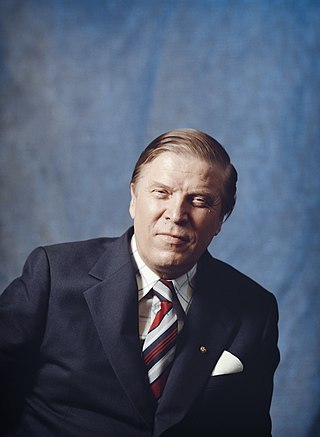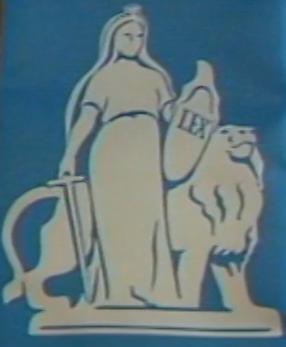
Urho Kaleva Kekkonen, often referred to by his initials UKK, was a Finnish politician who served as the eighth and longest-serving president of Finland from 1956 to 1982. He also served as prime minister, and held various other cabinet positions. He was the third and most recent president from the Agrarian League/Centre Party. Head of state for nearly 26 years, he dominated Finnish politics for 31 years overall. Holding a large amount of power, he won his later elections with little opposition and has often been classified as an autocrat.

Kyösti Kallio was a Finnish politician who served as the fourth president of Finland from 1937 to 1940. His presidency included leading the country through the Winter War; while he relinquished the post of commander-in-chief to Carl Gustaf Emil Mannerheim, he played a role as a spiritual leader. After the war, he became both the first President of Finland to resign and the only one to die in office, dying of a heart attack while returning home after submitting his resignation.

Baron Carl Gustaf Emil Mannerheim was a Finnish military leader and statesman. He served as the military leader of the Whites in the Finnish Civil War (1918), as Regent of Finland (1918–1919), as commander-in-chief of the Finnish Defence Forces during the period of World War II (1939–1945), and as the sixth president of Finland (1944–1946). He became Finland's only field marshal in 1933 and was appointed honorary Marshal of Finland in 1942.

Juho Kusti Paasikivi was a Finnish politician who served as the seventh president of Finland from 1946 to 1956. Representing the Finnish Party until its dissolution in 1918 and then the National Coalition Party, he previously served as senator, member of parliament, envoy to Stockholm (1936–1939) and Moscow (1940–1941), and Prime Minister of Finland. He also held several other positions of trust, and was an influential figure in Finnish economics and politics for over fifty years.

Kaarlo Juho Ståhlberg was a Finnish jurist and academic who was one of the most important pioneers of republicanism in the country. He was the first president of Finland (1919–1925) and a liberal nationalist.

Pehr Evind Svinhufvud af Qvalstad was the third president of Finland from 1931 to 1937. Serving as a lawyer, judge, and politician in the Grand Duchy of Finland, which was at that time an autonomous state under Russian Empire rule, Svinhufvud played a major role in the movement for Finnish independence. He was the one who presented the Declaration of Independence to the Parliament.

The president of the Republic of Finland is the head of state of Finland. The incumbent president is Sauli Niinistö, since 1 March 2012. He was elected for the first time in 2012 and was re-elected in 2018. Alexander Stubb was elected in 2024 and will take office on 1 March 2024.

The Parliament of Finland is the unicameral and supreme legislature of Finland, founded on 9 May 1906. In accordance with the Constitution of Finland, sovereignty belongs to the people, and that power is vested in the Parliament. The Parliament consists of 200 members, 199 of whom are elected every four years from 13 multi-member districts electing 7 to 36 members using the proportional D'Hondt method. In addition, there is one member from Åland.
The National Coalition Party is a largely liberal-conservative political party in Finland.

The Centre Party, officially the Centre Party of Finland, is an agrarian political party in Finland.

Johannes Virolainen was a Finnish politician and who served as 30th Prime Minister of Finland, helped inhabitants of Karelia, opposed the use of alcohol and created Mandatory Swedish in Finnish basic schools.
Suuret suomalaiset was a 2004 television show broadcast in Finland by Yle, which determined the 100 greatest Finns of all time according to the opinions of its viewers. The viewers were able to vote during a programme which lasted from October to December 2004. The show was a Finnish spin-off of the BBC's programme Great Britons.
Parliamentary elections were held in Finland on 21 and 22 September 1975.
Göran Albert Casimir "Casse" Ehrnrooth, titled Vuorineuvos, was a Finnish magnate and former chairman of the Nokia Corporation. His business career began in the forest industry, and later he was a director of UPM-Kymmene and Merita-Nordbanken.

The Constitutional Right Party was an anticommunist political party in Finland. The party was founded in 1973 by the parliamentarian Master in Law Georg C. Ehrnrooth as an anticommunist split from the Swedish People's Party (SFP).

Finland's overall corruption is relatively low, according to public opinion and global indexes and standards. The 2022 Corruption Perceptions Index released by Transparency International scored Finland at 87 on a scale from 0 to 100. When ranked by score, Finland shared second place with New Zealand among the 180 countries in the Index, where the country or countries ranked first are perceived to have the most honest public sector. For comparison, the best score was 90, the worst score was 12 and the average was 43.
Henrik Göran Casimir Ehrnrooth is a Finnish economist, manager and investor. Born in Helsinki, he has studied at the University of Helsinki and the Hanken School of Economics (1981).

The Independence Day Reception is an annual event organised by the President of Finland at the Presidential Palace in Helsinki on 6 December, Finland's Independence Day. Invitations are sent to all members of parliament and other representatives of the national and municipal governments, the ambassadors to Finland, representatives of NGOs, important business people, and people who distinguished themselves during the year in the arts, sports, sciences, and other fields.
For Independence was a right-wing political organization operating in Finland in the 1970s and 1980s, which opposed the influence of the Soviet Union in Finland, the policy of President Urho Kekkonen and socialism.

Kaarlo Henrik Hillilä was a Finnish politician who served as the provincial governor of Lapland (1938–1947), head of the market town of Rovaniemi, minister of the interior (1944–1945), minister of supply (1945–1946), and director general of the Social Insurance Institution (1946–1954).














